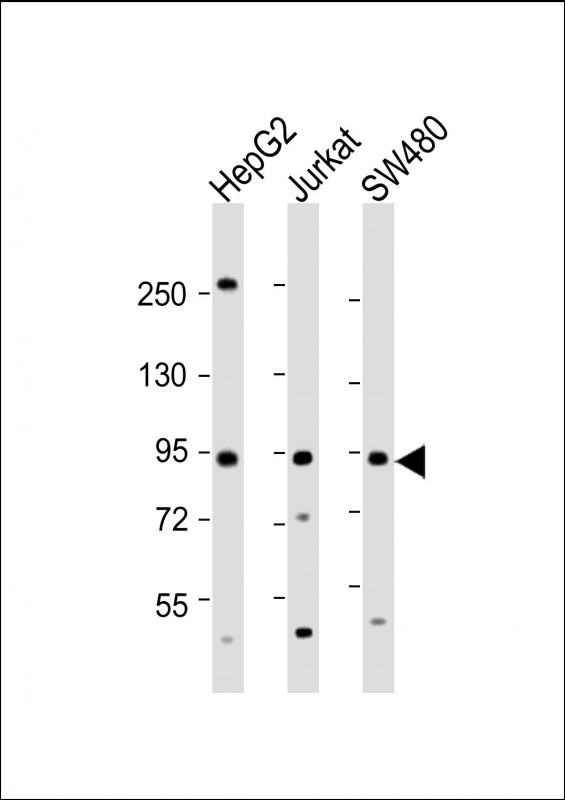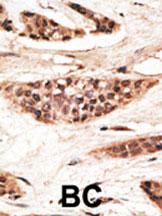


| WB | 1/1000-1/2000 | Human,Mouse,Rat |
| IF | 咨询技术 | Human,Mouse,Rat |
| IHC | 1/100-1/500 | Human,Mouse,Rat |
| ICC | 技术咨询 | Human,Mouse,Rat |
| FCM | 咨询技术 | Human,Mouse,Rat |
| Elisa | 咨询技术 | Human,Mouse,Rat |
| Aliases | Antigen peptide transporter 1, APT1, ATP-binding cassette sub-family B member 2, Peptide supply factor 1, Peptide transporter PSF1, PSF-1, Peptide transporter TAP1, Peptide transporter involved in antigen processing 1, Really interesting new gene 4 protein, TAP1, ABCB2, PSF1, RING4, Y3 |
| Entrez GeneID | 6890 |
| WB Predicted band size | 87.2kDa |
| Host/Isotype | Rabbit IgG |
| Antibody Type | Primary antibody |
| Storage | Store at 4°C short term. Aliquot and store at -20°C long term. Avoid freeze/thaw cycles. |
| Species Reactivity | Human |
| Immunogen | This TAP1 antibody is generated from rabbits immunized with a KLH conjugated synthetic peptide between 765-794 amino acids from the C-terminal region of human TAP1. |
| Formulation | Purified antibody in PBS with 0.05% sodium azide. |
+ +
以下是关于TAP1抗体的3篇参考文献及其简要摘要:
---
1. **文献名称**: "Defective expression of the TAP1 gene in human primary tumors causing complex HLA class I alterations"
**作者**: Seliger B, et al.
**摘要**: 该研究探讨了多种人类原发性肿瘤中TAP1基因表达缺陷及其对HLA I类分子抗原呈递的影响。研究发现,TAP1表达缺失导致肿瘤细胞表面HLA I类分子减少,可能与免疫逃逸和肿瘤进展相关。
---
2. **文献名称**: "Autoantibodies against type I IFNs in patients with autoimmune polyendocrine syndrome type 1"
**作者**: Meager A, et al.
**摘要**: 研究揭示了自身免疫性多内分泌腺病综合征1型(APS-1)患者中存在针对I型干扰素(IFN)的自身抗体,并发现TAP1功能缺陷可能通过干扰抗原呈递通路,加剧自身免疫反应。
---
3. **文献名称**: "Viral immune evasion through molecular mimicry of the TAP transporter"
**作者**: Hill A, et al.
**摘要**: 该文分析了病毒(如疱疹病毒)如何通过模拟TAP1蛋白结构抑制抗原呈递,从而逃避免疫系统。研究利用TAP1抗体揭示了病毒蛋白与宿主TAP1的相互作用机制。
---
这些文献涵盖了TAP1在肿瘤免疫、自身免疫病及病毒感染中的功能及其抗体的应用场景。如需具体实验细节,建议通过PubMed或学术数据库查询全文。
TAP1 (Transporter Associated with Antigen Processing 1) is a critical component of the antigen presentation pathway, enabling immune cells to recognize and respond to pathogens or abnormal cells. It is an ATP-binding cassette (ABC) transporter located in the endoplasmic reticulum (ER) membrane, forming a heterodimer with TAP2. Together, they transport peptide fragments from the cytosol into the ER lumen, where they bind to MHC class I molecules for presentation to CD8+ T cells. This process is essential for adaptive immunity, particularly in identifying and eliminating virus-infected or cancerous cells.
TAP1 antibodies are tools used to detect and study the expression, localization, and function of the TAP1 protein. Dysregulation of TAP1 has been linked to immune evasion mechanisms in cancers, viral infections (e.g., herpesviruses), and autoimmune disorders. For instance, reduced TAP1 expression in tumors can impair antigen presentation, allowing cancer cells to evade immune surveillance. In autoimmune conditions, aberrant TAP1 activity may contribute to inappropriate immune activation.
These antibodies are widely applied in techniques like Western blotting, immunohistochemistry (IHC), and flow cytometry. Researchers use them to investigate TAP1's role in disease models, therapeutic responses (e.g., checkpoint inhibitors), or genetic disorders like bare lymphocyte syndrome. Commercial TAP1 antibodies are often validated using knockout cell lines to ensure specificity. Understanding TAP1 dynamics through antibody-based assays provides insights into immune dysfunction and guides strategies to modulate antigen presentation for therapeutic benefit.
×